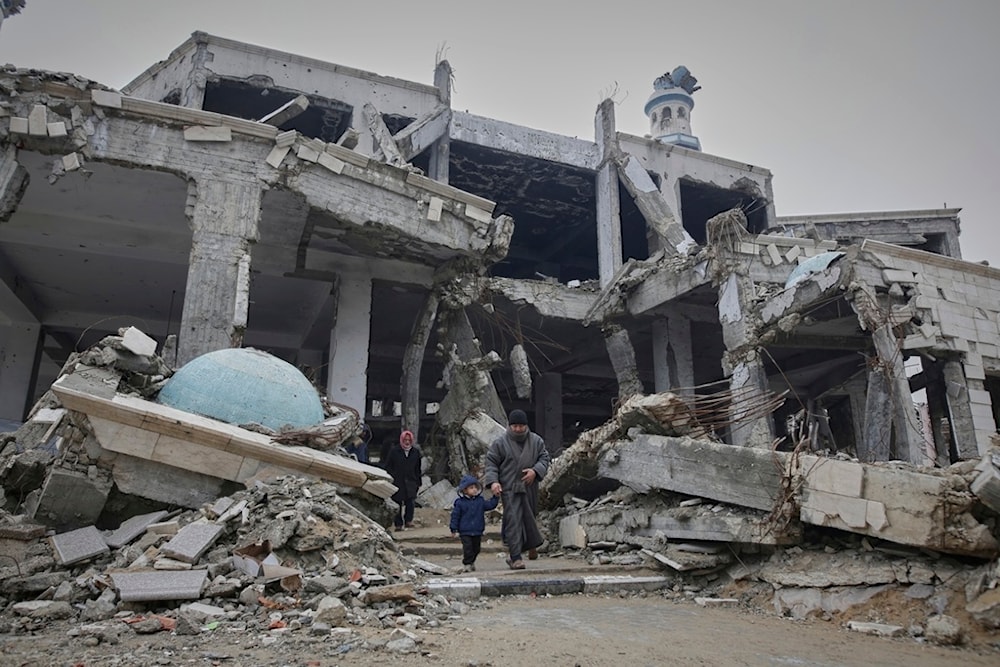Hamas delegation arrives in Cairo to discuss second phase of ceasefire
Egypt announces that it is conducting extensive communication with all parties to the Gaza ceasefire in hopes of swiftly reaching the second phase of the ceasefire deal.
-

Palestinians leave after attending the first Friday prayers of the Muslim holy month of Ramadan at the Imam Shafi'i Mosque, damaged by Israeli army strikes, in the Zeitoun neighborhood in Gaza City, Friday, March 7, 2025 (AP)
The Egyptian State Information Service announced Friday that a Hamas delegation had arrived in Cairo to discuss the implementation of the ceasefire agreement in Gaza and to push negotiations toward the second phase.
In a statement, the authority said, "Cairo is conducting intensive contacts with all parties to swiftly reach the second phase of the truce."
It added that Egypt's high-level meetings with Hamas leaders, alongside contacts with the US and Qatar, aim to finalize the ceasefire agreement.
The statement also noted that Egyptian-Qatari efforts are focused on securing the necessary guarantees to advance to the second phase of the ceasefire and prisoner exchange agreement in Gaza.
Meanwhile, Egypt has reaffirmed its commitment to facilitating negotiations for the next phase of the ceasefire deal. Foreign Minister Badr Abdelatty stressed that "full and faithful adherence to all terms of the ceasefire and prisoner exchange in Gaza is essential."
This development follows direct meetings between Hamas and US officials in Qatar, marking the first such discussions on the second phase of the Gaza agreement.
Hamas urges for second phase of talks
Senior Hamas official Osama Hamdan pointed out on Monday "Israel" and its Prime Minister, Benjamin Netanyahu, seek to resume the aggression and crimes against the Palestinian people in the Gaza Strip following the conclusion of the first phase of the ceasefire agreement, while attempting to hide behind the US position, s
In a televised statement, Hamdan noted that Israeli violations have not stopped since the very first moment of the ceasefire.
"Violations of the agreement during the first phase prove beyond a doubt that the (Israeli) occupation government was interested in the collapse of the agreement and worked hard to this end," he said.
The Palestinian official described Netanyahu’s recent decision to adopt a US proposal for extending the first phase of the agreement—through arrangements that contradict the original terms—as "a blatant attempt to evade the agreement and avoid entering into negotiations for the second phase."
"The occupation is pushing to return things to square one and overturn the agreement through the alternatives it is proposing," Hamdan warned.
In this context, he listed the key violations that "Israel" committed during the first phase of the ceasefire agreement.
Violations related to humanitarian relief, shelter, and protocols
Hamdan said "Israel" prevented the entry of 50 fuel trucks per day as stipulated in the agreement. Over 42 days, only 978 trucks were permitted, averaging just 23 trucks per day.
The occupation also prevented the commercial sector from importing fuel of any kind, despite a clear provision in the agreement allowing it.
Only 15 mobile homes (caravans) were allowed entry out of the 60,000 agreed upon, in addition to a limited number of tents.
"Israel" blocked the entry of heavy machinery needed to clear rubble and recover bodies from under the debris, permitting only nine pieces of equipment, when at least 500 are required.
The occupation denied the entry of construction and finishing materials essential for rebuilding infrastructure and hospitals.
Medical equipment needed for hospital rehabilitation was largely barred, with only five ambulances allowed in, while civil defense equipment was completely denied entry.
"Israel" prevented the operation of the power plant and blocked the delivery of necessary supplies for its rehabilitation.
It also barred cash liquidity from reaching banks and refused to replace worn-out banknotes.

 4 Min Read
4 Min Read








